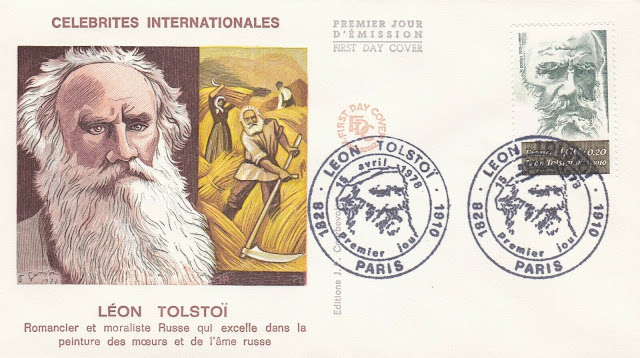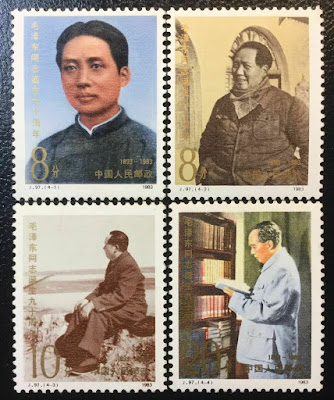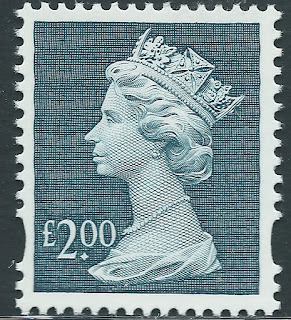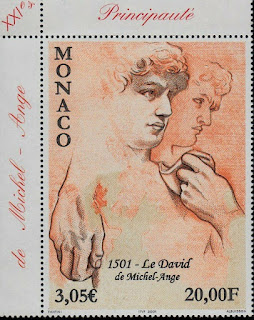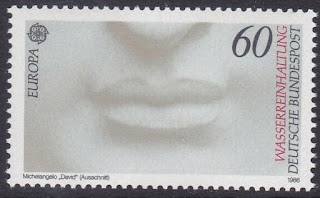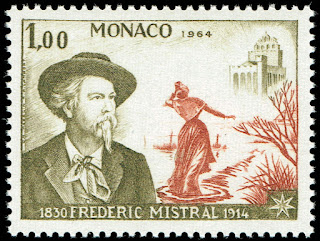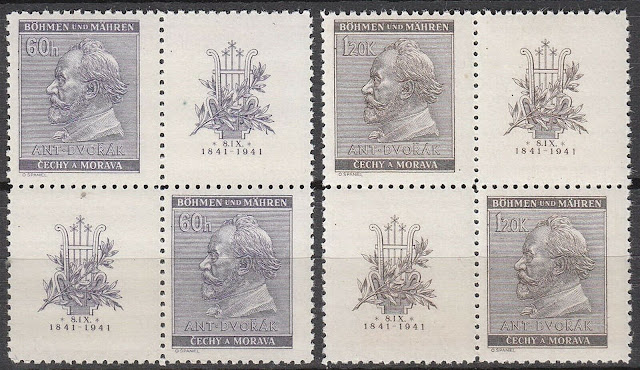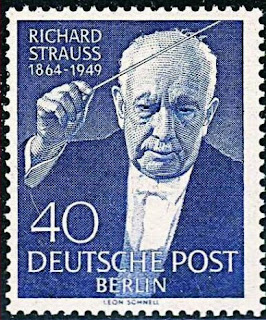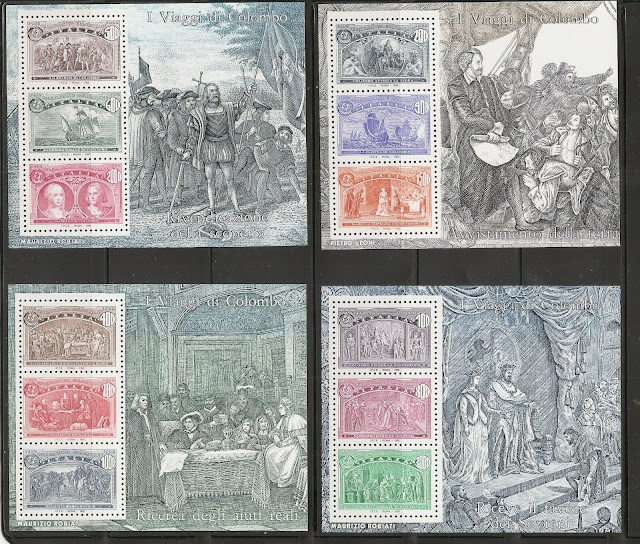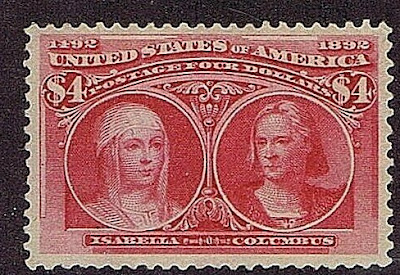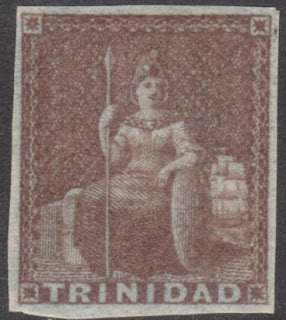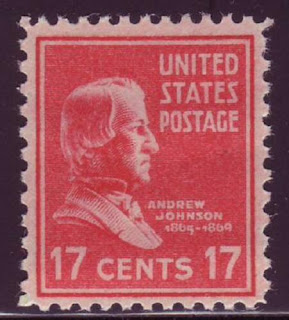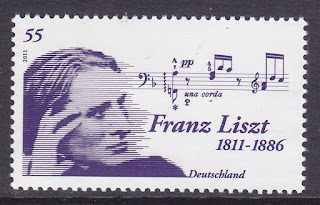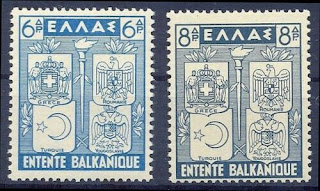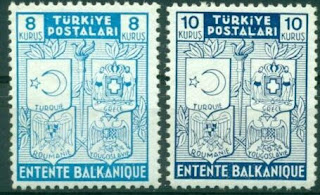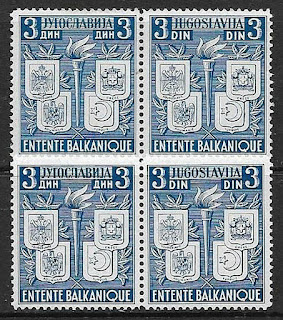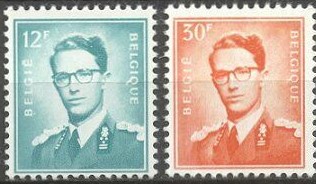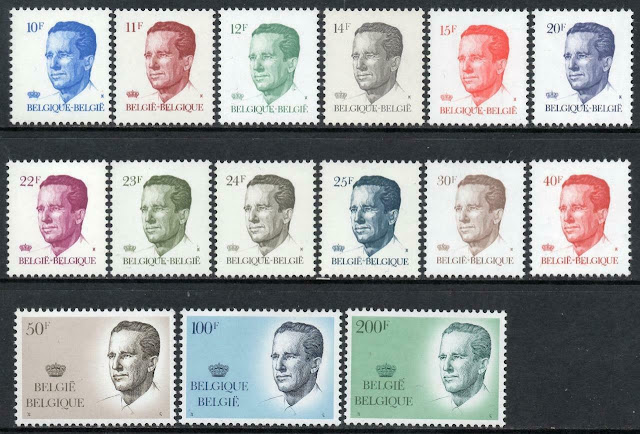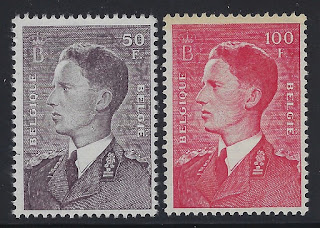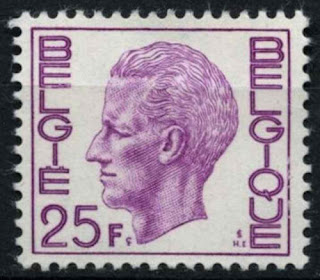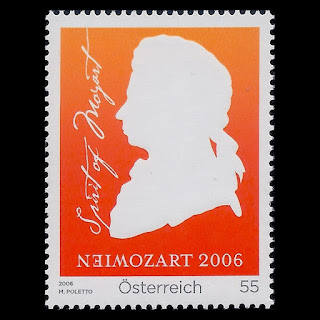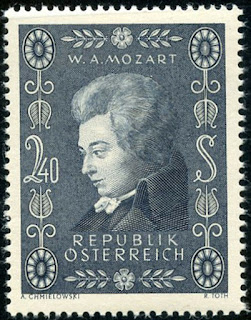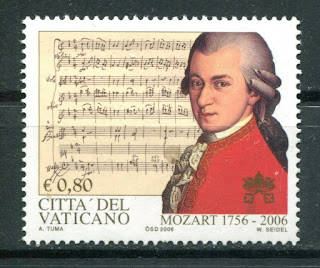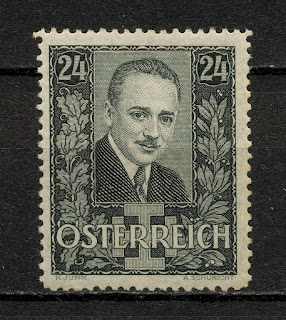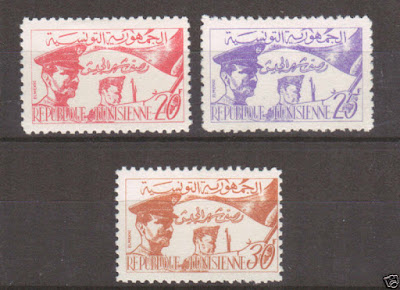Monday, September 09, 2019
September 9th in stamps Tolstoy, Elizabeth II, Mao Zedong
1828 Born: Leo Tolstoy, Russian author and playwright (d. 1910)
Count Lev Nikolayevich Tolstoy (9 September [O.S. 28 August] 1828 – 20 November [O.S. 7 November] 1910), usually referred to in English as Leo Tolstoy, was a Russian writer who is regarded as one of the greatest authors of all time. He received multiple nominations for Nobel Prize in Literature every year from 1902 to 1906, and nominations for Nobel Peace Prize in 1901, 1902 and 1910, and his miss of the prize is a major Nobel prize controversy.
Born to an aristocratic Russian family in 1828, he is best known for the novels War and Peace (1869) and Anna Karenina (1877), often cited as pinnacles of realist fiction. He first achieved literary acclaim in his twenties with his semi-autobiographical trilogy, Childhood, Boyhood, and Youth (1852–1856), and Sevastopol Sketches (1855), based upon his experiences in the Crimean War. Tolstoy's fiction includes dozens of short stories and several novellas such as The Death of Ivan Ilyich (1886), Family Happiness (1859), and Hadji Murad (1912). He also wrote plays and numerous philosophical essays.
1976 Died: Mao Zedong, Chinese philosopher, academic, and politician, 1st Chairman of the Communist Party of China (b. 1893)
Mao Zedong (December 26, 1893 – September 9, 1976), also known as Chairman Mao, was a Chinese communist revolutionary who became the founding father of the People's Republic of China (PRC), which he ruled as the Chairman of the Communist Party of China from its establishment in 1949 until his death in 1976. Ideologically a Marxist–Leninist, his theories, military strategies, and political policies are collectively known as Maoism.
A controversial figure, Mao is regarded as one of the most important and influential individuals in modern world history. He is also known as a political intellect, theorist, military strategist, poet, and visionary. Supporters credit him with driving imperialism out of China, modernizing the nation and building it into a world power, promoting the status of women, improving education and health care, as well as increasing life expectancy as China's population grew from around 550 million to over 900 million under his leadership. Conversely, his regime has been called autocratic and totalitarian, and condemned for bringing about mass repression and destroying religious and cultural artifacts and sites. It was additionally responsible for vast numbers of deaths with estimates ranging from 30 to 70 million victims through starvation, prison labor and mass executions
2015 – Elizabeth II became the longest reigning monarch of the United Kingdom.
Queen Elizabeth II became the longest-reigning British monarch on 9 September 2015 when she surpassed the reign of her great-great-grandmother Victoria. On 6 February 2017 she became the first British monarch to celebrate a Sapphire Jubilee, commemorating 65 years on the throne.
Elizabeth II (Elizabeth Alexandra Mary Windsor; born 21 April 1926) is Queen of the United Kingdom and the other Commonwealth realms.
Elizabeth was born in London as the first child of the Duke and Duchess of York, later King George VI and Queen Elizabeth, and she was educated privately at home. Her father acceded to the throne on the abdication of his brother King Edward VIII in 1936, from which time she was the heir presumptive. She began to undertake public duties during the Second World War, serving in the Auxiliary Territorial Service. In 1947, she married Prince Philip, Duke of Edinburgh, a former prince of Greece and Denmark, with whom she has four children: Charles, Prince of Wales; Anne, Princess Royal; Prince Andrew, Duke of York; and Prince Edward, Earl of Wessex
Sunday, September 08, 2019
September 8th in stamps Michelangelo David, Dvořák, Strauss, Frédéric Mistral
Here are some events that happened on September 8th. It could be an event or a person that died or was born on that day
1830 Born: Frédéric Mistral, French lexicographer and poet, 1904 Nobel Prize laureate (d. 1914)
Frederic Mistral (Occitan: Josèp Estève Frederic Mistral, 8 September 1830 – 25 March 1914) was a French writer of Occitan literature and lexicographer of the Provençal form of the language. Mistral received the 1904 Nobel Prize in Literature "in recognition of the fresh originality and true inspiration of his poetic production, which faithfully reflects the natural scenery and native spirit of his people, and, in addition, his significant work as a Provençal philologist". He was a founding member of the Félibrige and a member of l'Académie de Marseille.
His name in his native language was Frederi Mistral (Mistrau) according to the Mistralian orthography or Frederic Mistral (or Mistrau) according to the classical orthography.
Mistral's fame was owing in part to Alphonse de Lamartine who sang his praises in the 40th edition of his periodical Cours familier de littérature, following the publication of Mistral's long poem Mirèio. Alphonse Daudet, with whom he maintained a long friendship, eulogized him in "Poet Mistral", one of the stories in his collection Letters from My Windmill (Lettres de mon moulin).
Stamps from France and Monaco depicting Frédéric Mistral
Wednesday, July 31, 2019
July 31st in stamps Columbus discovers Trinidad, Franz Listz, Balkan Entente, Baudouin, Andrew Johnson, Peter Rosegger
1498 – On his third voyage to the Western Hemisphere, Christopher Columbus becomes the first European to discover the island of Trinidad.
Trinidad is the larger and more populous of the two major islands of Trinidad and Tobago. The island lies 11 km (6.8 mi) off the northeastern coast of Venezuela and sits on the continental shelf of South America. Though geographically part of the South American continent, from a socio-economic standpoint it is often referred to as the southernmost island in the Caribbean. With an area of 4,768 km2 (1,841 sq mi), it is also the fifth largest in the West Indies.
Caribs and Arawaks lived in Trinidad long before Christopher Columbus encountered the islands on his third voyage on 31 July 1498. The island remained Spanish until 1797, but it was largely settled by French colonists from the French Caribbean, especially Martinique. In 1889 the two islands became a single British Crown colony. Trinidad and Tobago obtained self-governance in 1958 and independence from the United Kingdom in 1962
Some stamps from Trinidad as well as stamps depicting Columbus or his voyages
Johnson was born in poverty in Raleigh, North Carolina, and never attended school. He was apprenticed as a tailor and worked in several frontier towns before settling in Greeneville, Tennessee. He served as alderman and mayor there before being elected to the Tennessee House of Representatives in 1835. After brief service in the Tennessee Senate, Johnson was elected to the House of Representatives in 1843, where he served five two-year terms. He became governor of Tennessee for four years, and was elected by the legislature to the Senate in 1857. In his congressional service, he sought passage of the Homestead Bill which was enacted soon after he left his Senate seat in 1862. Southern slave states seceded to form the Confederate States of America, including Tennessee, but Johnson remained firmly with the Union. He was the only sitting senator from a Confederate state who did not resign his seat upon learning of his state's secession. In 1862, Lincoln appointed him as military governor of Tennessee after most of it had been retaken. In 1864, Johnson was a logical choice as running mate for Lincoln, who wished to send a message of national unity in his re-election campaign; and became Vice-President after a victorious election in 1864.
Johnson implemented his own form of Presidential Reconstruction, a series of proclamations directing the seceded states to hold conventions and elections to reform their civil governments. Southern states returned many of their old leaders and passed Black Codes to deprive the freedmen of many civil liberties, but Congressional Republicans refused to seat legislators from those states and advanced legislation to overrule the Southern actions. Johnson vetoed their bills, and Congressional Republicans overrode him, setting a pattern for the remainder of his presidency. Johnson opposed the Fourteenth Amendment which gave citizenship to former slaves. In 1866, he went on an unprecedented national tour promoting his executive policies, seeking to break Republican opposition. As the conflict grew between the branches of government, Congress passed the Tenure of Office Act restricting Johnson's ability to fire Cabinet officials. He persisted in trying to dismiss Secretary of War Edwin Stanton, but ended up being impeached by the House of Representatives and narrowly avoided conviction in the Senate. He did not win the 1868 Democratic presidential nomination and left office the following year.
Johnson returned to Tennessee after his presidency and gained some vindication when he was elected to the Senate in 1875, making him the only former president to serve in the Senate. He died five months into his term. Johnson's strong opposition to federally guaranteed rights for black Americans is widely criticized; he is regarded by many historians as one of the worst presidents in American history.
US stamps depicting Andrew Johnson
Franz Liszt (22 October 1811 – 31 July 1886) was a Hungarian composer, virtuoso pianist, conductor, music teacher, arranger, and organist of the Romantic era. He was also a writer, a philanthropist, a Hungarian nationalist and a Franciscan tertiary.
Liszt gained renown in Europe during the early nineteenth century for his prodigious virtuosic skill as a pianist. He was a friend, musical promoter and benefactor to many composers of his time, including Frédéric Chopin, Richard Wagner, Hector Berlioz, Robert Schumann, Camille Saint-Saëns, Edvard Grieg, Ole Bull, Joachim Raff, Mikhail Glinka, and Alexander Borodin.
A prolific composer, Liszt was one of the most prominent representatives of the New German School (Neudeutsche Schule). He left behind an extensive and diverse body of work which influenced his forward-looking contemporaries and anticipated 20th-century ideas and trends. Among Liszt's musical contributions were the symphonic poem, developing thematic transformation as part of his experiments in musical form, and radical innovations in harmony.
Stamps from various countries depicting Franz Liszt
1918 Died: Peter Rosegger, Austrian poet and author (b. 1843)
Peter Rosegger (original Roßegger ) (31 July 1843 – 26 June 1918) was an Austrian writer and poet from Krieglach in the province of Styria. He was a son of a mountain farmer and grew up in the woodlands and mountains of Alpl. Rosegger (or Rossegger) went on to become a most prolific poet and author as well as an insightful teacher and visionary.
In his later years, he was honored by officials from various Austrian universities and the city of Graz (the capital of Styria). He was nominated for the Nobel Prize in Literature three times. He was nearly awarded the Nobel Prize in 1913 and is (at least among the people of Styria) something like a national treasure to this day.
The Salonika Agreement (also called the Thessaloniki Accord) was a treaty signed on 31 July 1938 between Bulgaria on the one hand and the Balkan Entente—the states of Greece, Romania, Turkey and Yugoslavia—on the other. The signatories were, for the former, Prime Minister Georgi Kyoseivanov and, for the latter, in his capacity as President of the Council of the Balkan Entente, Ioannis Metaxas, Prime Minister and Foreign Minister of Greece.
The agreement was the result of the realization by the Entente that Bulgaria alone could not threaten the members of the Entente acting in concert, and that the Bulgarian government desired to follow a policy of peace. There were at least two signs of this. A protocol signed at Belgrade on 17 March 1934 by the Balkan Entente was published privately in May, revealing that the members had plans to jointly occupy Bulgaria if efforts to suppress terrorist organizations operating out of her territory were not successful. The new Bulgarian government of Kimon Georgiev, coming to power on 19 May, responded to the private revelation by clamping down on the Internal Macedonian Revolutionary Organization. Then, on 24 January 1937, Bulgaria concluded a treaty of eternal friendship with Yugoslavia, which was approved by the other members of the Entente. (Initially Greece was very hostile.) In November 1936, the chiefs of staff of the four Balkan powers signed a draft military alliance, which was subsequently confirmed as an integral part of the Balkan Pact at the meeting of the Balkan Council on 15–18 February 1937.
The agreement removed the arms restrictions placed on Bulgaria after World War I by the Treaty of Neuilly-sur-Seine, and allowed her to occupy the demilitarised zone bordering Greece. The demilitarised zones along the Turkish borders with Bulgaria and Greece, a result of the Treaty of Lausanne, were also abandoned. All the parties committed to a policy of non-aggression, but Bulgaria was not forced to abandon her territorial revisionism.
Stamps issued by the four Balkan Entente countries
1993 Died: Baudouin, King of Belgium (b. 1930)
Baudouin (Dutch: Boudewijn, German: Balduin; 7 September 1930 – 31 July 1993) was the King of the Belgians, following his father's abdication, from 1951 until his death in 1993. He was the last Belgian king to be sovereign of the Congo.
He was the elder son of King Leopold III (1901–83) and his first wife, Princess Astrid of Sweden (1905–35). Because he and his wife, Queen Fabiola, had no children, at Baudouin's death the crown passed to his younger brother, Albert II.
Some Belgian stamps depicting King Baudouin
Thursday, July 25, 2019
July 25th in stamps Mozart, Dollfuss, Republic of Tunisia
1788 – Wolfgang Amadeus Mozart completes his Symphony No. 40 in G minor
Wolfgang Amadeus Mozart (27 January 1756 – 5 December 1791), baptized as Johannes Chrysostomus Wolfgangus Theophilus Mozart, was a prolific and influential composer of the classical era.
Born in Salzburg, Mozart showed prodigious ability from his earliest childhood. Already competent on keyboard and violin, he composed from the age of five and performed before European royalty. At 17, Mozart was engaged as a musician at the Salzburg court but grew restless and traveled in search of a better position. While visiting Vienna in 1781, he was dismissed from his Salzburg position. He chose to stay in the capital, where he achieved fame but little financial security. During his final years in Vienna, he composed many of his best-known symphonies, concertos, and operas, and portions of the Requiem, which was largely unfinished at the time of his early death at the age of 35. The circumstances of his death have been much mythologized.
He composed more than 600 works, many of which are acknowledged as pinnacles of symphonic, concertante, chamber, operatic, and choral music. He is among the most enduringly popular of classical composers, and his influence is profound on subsequent Western art music. Ludwig van Beethoven composed his early works in the shadow of Mozart, and Joseph Haydn wrote: "posterity will not see such a talent again in 100 years".
Some stamps from various countries commemorating Mozart
1934 – The Nazis assassinate Austrian Chancellor Engelbert Dollfuss in a failed coup attempt.
Engelbert Dollfuss (German: Engelbert Dollfuß, IPA, 4 October 1892 – 25 July 1934) was an Austrian politician who served as Chancellor of Austrian between 1932 and 1934. Having served as Minister for Forests and Agriculture, he ascended to Federal Chancellor in 1932 in the midst of a crisis for the conservative government. In early 1933, he shut down parliament, banned the Austrian Nazi party and assumed dictatorial powers. Suppressing the Socialist movement in February 1934, he cemented the rule of "Austrofascism" through the authoritarian First of May Constitution. Dollfuss was assassinated as part of a failed coup attempt by Nazi agents in 1934. His successor Kurt Schuschnigg maintained the regime until Adolf Hitler's annexation of Austria in 1938.
Stamps from Austria depicting Engelbert Dollfuss
1957 – The Republic of Tunisia is proclaimed, under President Habib Bourguiba.
Tunisia achieved independence from France on March 20, 1956 with Habib Bourguiba as Prime Minister. March 20 is celebrated annually as Tunisian Independence Day. A year later, Tunisia was declared a republic, with Bourguiba as the first President. From independence in 1956 until the 2011 revolution, the government and the Constitutional Democratic Rally (RCD), formerly Neo Destour and the Socialist Destourian Party, were effectively one. Following a report by Amnesty International, The Guardian called Tunisia "one of the most modern but repressive countries in the Arab world".
In November 1987, doctors declared Bourguiba unfit to rule and, in a bloodless coup d'état, Prime Minister Zine El Abidine Ben Ali assumed the presidency in accordance with Article 57 of the Tunisian constitution. The anniversary of Ben Ali's succession, 7 November, was celebrated as a national holiday. He was consistently re-elected with enormous majorities every five years (well over 80 percent of the vote), the last being 25 October 2009,[68] until he fled the country amid popular unrest in January 2011.
Stamps from Tunisia issued after the republic was proclaimed as well as a set of stamps depicting Habib Bourguiba
